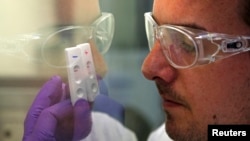New diagnostic tests to more rapidly and simply detect Ebola could be available for use in the West Africa epidemic in the next few months, the World Health Organization and partner agencies say.
It now takes between nine hours and four days to get confirmation of a suspected case of Ebola in West Africa. By any measure, this is too long because the virus spreads quickly and more infections can occur while awaiting test results. Health agencies agree there is an urgent need for innovative ways to provide rapid, sensitive, safe and simple testing.
WHO, Doctors Without Borders and the private organization the Foundation of Innovative New Diagnostics, are working with a number of companies to develop the tests and review them in record time.
Dr. Francis Moussy, who’s focusing on Ebola diagnostics at WHO, told VOA two types of tests are being considered.
"The rapid-pregnancy type of test, that may take about 15 minutes, and the other ones based on nucleic acid technology of the genetic material of the virus. And those tests may take maybe around one hour," Moussy said. "... This second category of tests would probably be more sensitive. We would be able to pick up the virus more easily."
FIND’s chief scientific officer, Mark Perkins, said field trials for one of the diagnostic tests would begin in February, probably either in Sierra Leone or Guinea. Those two countries, along with Liberia, have been hardest hit by the epidemic.
"We would be looking primarily at how implementable, how useable such tests would be, how easy is it, how much training is required, how feasible is it to implement these outside biosafety-level laboratories, etc.," Perkins said. "The trials would be relatively brief. We imagine spending two to four weeks on such studies."
The three West African countries collectively have 19 mobile laboratories, and three more soon will be deployed.
WHO said there are plans to move smaller, more flexible lab facilities closer to where patients live, enabling people to quickly know whether they have tested positive for Ebola. If that is the case, then treatment for the disease can begin as soon as possible.




